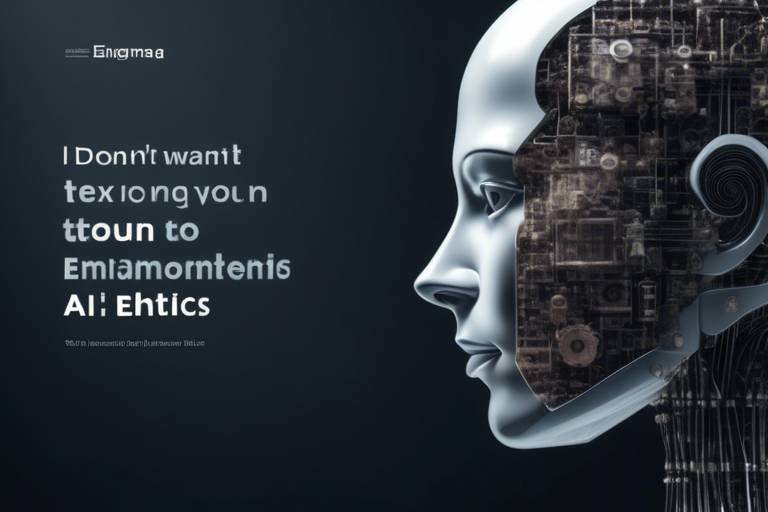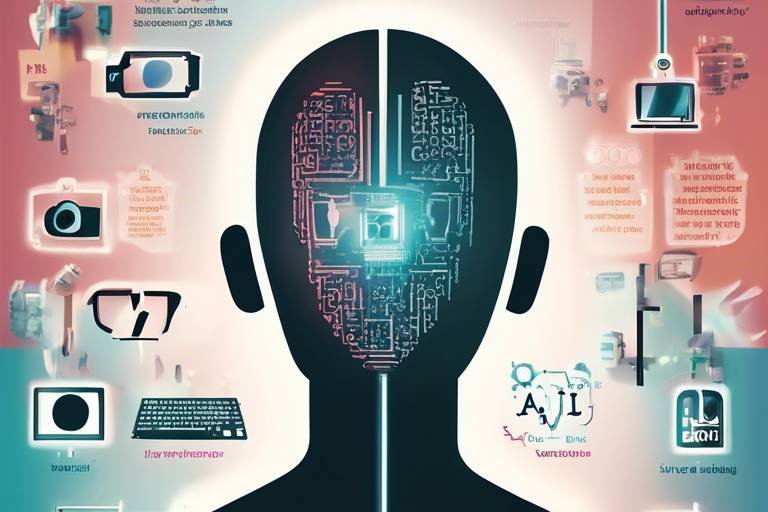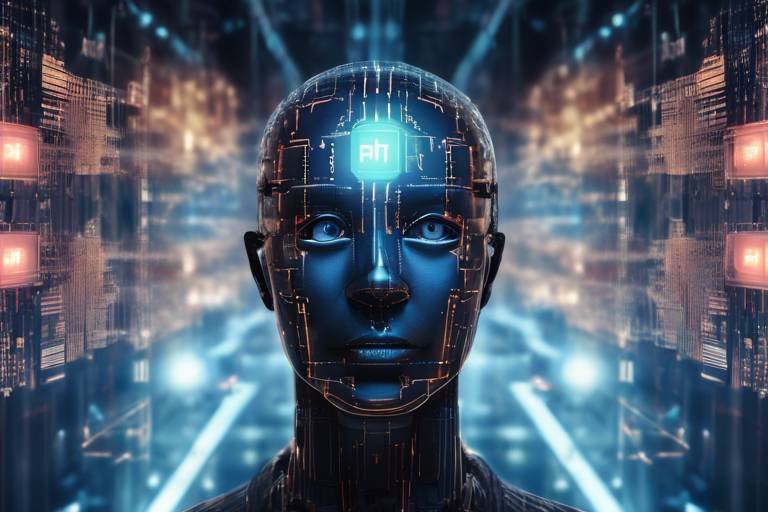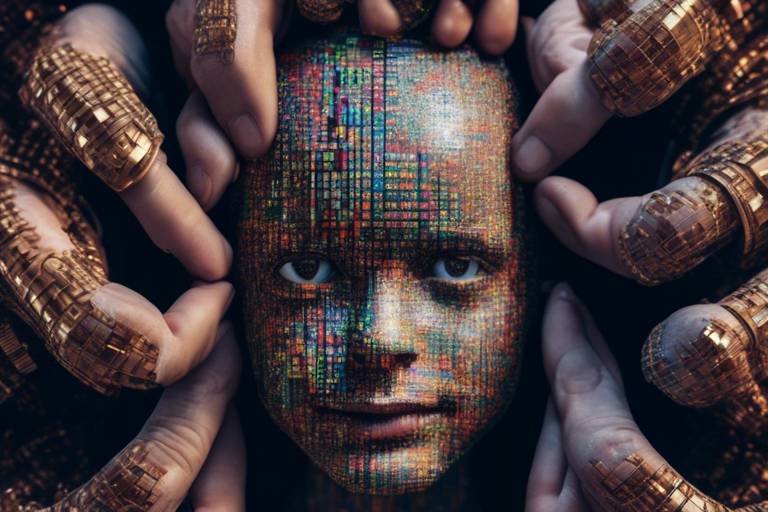Decoding the Enigma of AI Ethics
In today's rapidly evolving technological landscape, the intersection of artificial intelligence (AI) and ethics has become a hotbed of discussion and debate. As we embrace the potential of AI to transform industries, enhance efficiency, and improve our daily lives, we must also grapple with the ethical implications that accompany these advancements. The question arises: how do we ensure that AI serves humanity positively while minimizing potential harm? This article sets out to explore the complex landscape of AI ethics, examining its implications, challenges, and the frameworks that guide responsible AI development and deployment in our society.
AI is not just a tool; it’s a powerful agent of change that can impact every aspect of our lives—from the way we work to how we interact with one another. However, with great power comes great responsibility. Ethical considerations in AI aren't merely an afterthought; they are fundamental to the technology's acceptance and effectiveness. Imagine a world where AI systems make decisions that affect your daily life without any checks and balances—sounds daunting, right? That’s why understanding AI ethics is crucial. It’s about ensuring that the technology we create reflects our values and serves the greater good.
The ethical landscape of AI is not just about avoiding harm; it’s also about promoting positive outcomes. This involves a commitment to principles such as fairness, accountability, transparency, and privacy. Each of these principles serves as a guiding star for developers and organizations striving to create AI systems that are not only effective but also equitable. For instance, consider fairness in AI: it's about ensuring that algorithms do not perpetuate existing biases or create new forms of discrimination. This is particularly relevant in sectors like hiring, law enforcement, and healthcare, where biased AI can lead to devastating consequences.
As we delve deeper into the world of AI ethics, we will uncover the key principles that must be upheld to foster trust and accountability. We will also address the challenges that arise in this domain, including regulatory hurdles and cultural differences that shape our understanding of what is ethical. The journey through AI ethics is not straightforward; it requires continuous dialogue, adaptation, and a commitment to learning from our experiences. By engaging in this conversation, we can work towards a future where AI not only enhances our lives but does so in a way that is just and equitable for all.
Understanding the significance of ethics in AI is crucial for ensuring technology serves humanity positively while minimizing harm. This section delves into why ethical considerations are paramount in AI development.
This section outlines fundamental ethical principles such as fairness, accountability, transparency, and privacy, which form the backbone of responsible AI practices and guide developers in creating equitable systems.
Fairness is essential for preventing bias in AI algorithms. This subsection discusses methods to ensure that AI systems treat all users equitably, highlighting the importance of diverse data sets and inclusive design.
Algorithmic bias can lead to unjust outcomes. This section examines strategies to identify and mitigate bias in AI systems, ensuring they operate fairly across different demographics and contexts.
Inclusive design practices are vital for ethical AI. This part explores how engaging diverse teams and stakeholders can enhance the fairness and effectiveness of AI technologies, leading to better societal outcomes.
Establishing accountability in AI development is crucial for fostering trust. This section discusses the roles of developers, organizations, and policymakers in ensuring responsible AI usage and addressing potential harms.
Despite the importance of AI ethics, numerous challenges persist, including rapid technological advancement, regulatory uncertainties, and varying cultural perspectives. This section highlights these obstacles and their implications for ethical AI.
Navigating the regulatory landscape is complex. This subsection examines existing legal frameworks governing AI ethics and the need for new regulations to keep pace with technological advancements.
Cultural differences can influence ethical perceptions of AI. This part explores how varying societal values shape ethical considerations and the importance of cultural sensitivity in global AI development.
- What is AI ethics? AI ethics refers to the moral principles and guidelines that govern the development and use of artificial intelligence technologies.
- Why is fairness important in AI? Fairness is crucial to prevent bias and discrimination in AI systems, ensuring that all users are treated equitably.
- How can we ensure accountability in AI? Establishing clear roles and responsibilities for developers, organizations, and policymakers can help foster accountability in AI systems.
- What challenges do we face in AI ethics? Challenges include rapid technological advancement, regulatory uncertainties, and cultural differences that affect ethical perceptions.

The Importance of AI Ethics
In today's fast-paced digital world, where artificial intelligence (AI) is becoming increasingly integrated into our daily lives, understanding the significance of ethics in AI is more crucial than ever. As we stand on the brink of technological advancements that could reshape society, it’s vital to ensure that these innovations serve humanity positively while minimizing potential harm. Think of AI as a double-edged sword; it can either be a powerful ally in solving complex problems or a dangerous tool that exacerbates existing inequalities and biases.
At its core, AI ethics is about making sure that the technologies we develop and deploy are aligned with our moral values. This involves a careful examination of how AI systems are designed, implemented, and monitored. Without a solid ethical framework, we risk creating systems that could lead to unintended consequences, such as discrimination, privacy violations, and a lack of accountability.
One of the primary reasons why ethical considerations are paramount in AI development is the potential impact of these technologies on people's lives. AI systems are increasingly making decisions that affect various aspects of our lives, from hiring processes to loan approvals and even law enforcement. Therefore, if these systems are not guided by ethical principles, they could perpetuate existing biases or create new forms of injustice. For instance, a hiring algorithm trained on biased data might favor certain demographics over others, leading to unfair job opportunities.
Moreover, ethical AI practices can foster trust among users. When people know that the AI systems they interact with are designed with ethics in mind, they are more likely to embrace these technologies. This trust is essential, especially as we navigate through the complexities of data privacy and security. By prioritizing ethics, organizations can build a solid reputation and create a loyal user base.
In addition to trust, ethical AI can enhance the overall quality of decision-making. When developers incorporate ethical principles into their work, they are more likely to create systems that consider diverse perspectives and potential impacts. This leads to better outcomes for everyone involved. For example, in healthcare, AI systems developed with ethics in mind can provide more accurate diagnoses and treatment recommendations, ultimately improving patient care.
To summarize, the importance of AI ethics cannot be overstated. It is not just a buzzword but a necessity for ensuring that technology serves humanity positively. By prioritizing ethical considerations, we can:
- Prevent bias and discrimination in AI systems
- Foster trust and transparency among users
- Enhance the quality of decision-making
- Ensure accountability in AI development and deployment
As we continue to innovate and integrate AI into various sectors, keeping ethics at the forefront will be essential for creating a future where technology uplifts rather than undermines our society.

Key Ethical Principles in AI
In the rapidly evolving world of artificial intelligence, understanding the key ethical principles that govern its development and deployment is not just important; it's essential. These principles serve as the backbone of responsible AI practices, ensuring that the technology we create is not only innovative but also aligns with our societal values. The core principles include fairness, accountability, transparency, and privacy. Each of these principles plays a crucial role in guiding developers and organizations as they navigate the complex landscape of AI.
First and foremost, fairness in AI is about ensuring that algorithms do not perpetuate biases that can lead to discriminatory outcomes. Imagine a world where your job application is evaluated by an AI that has been trained on biased data—this could unfairly disadvantage certain groups. Therefore, developers must actively seek to create systems that treat all users equitably. This involves using diverse data sets and engaging in inclusive design practices. By doing so, we can help ensure that AI systems reflect the diversity of the user population they serve.
Next, we have accountability, which is vital for building trust in AI technologies. When something goes wrong—like an AI making a harmful decision—who is responsible? Is it the developer, the organization, or the AI itself? Establishing clear lines of accountability means that all stakeholders, including developers, organizations, and policymakers, must work together to ensure responsible AI usage. This collaborative approach can help mitigate potential harms and foster a culture of trust in AI technologies.
Transparency is another key principle. Users should be able to understand how AI systems make decisions. This is akin to reading the ingredients on a food label; you want to know what you're consuming. Similarly, understanding the decision-making processes of AI can empower users and promote informed consent. Developers should strive to create systems that are not only effective but also explainable, allowing users to see the logic behind AI decisions.
Finally, we cannot overlook privacy. In an age where data is the new oil, protecting user information is paramount. AI systems often require vast amounts of data to function effectively, but this data must be handled with care. Developers must adhere to strict privacy guidelines to ensure that user data is collected, stored, and processed responsibly. This is not just about compliance; it’s about building a relationship of trust between users and AI technologies.
In summary, the ethical principles of fairness, accountability, transparency, and privacy are crucial for guiding the development of AI technologies. These principles not only help prevent harm but also promote a more equitable and just society. As we continue to innovate and push the boundaries of what AI can achieve, keeping these principles at the forefront of our efforts will ensure that technology serves humanity in a positive way.
- What is AI ethics? AI ethics refers to the moral principles and guidelines that govern the development and use of artificial intelligence technologies.
- Why is fairness important in AI? Fairness is crucial to prevent biases in AI systems that could lead to discrimination against certain groups of people.
- How can we ensure accountability in AI? Establishing clear responsibilities among developers, organizations, and policymakers helps ensure that AI systems are used responsibly.
- What role does transparency play in AI? Transparency allows users to understand how AI systems make decisions, fostering trust and informed consent.
- Why is privacy a concern in AI? AI systems often require large amounts of personal data, making it essential to protect user information to maintain trust and comply with regulations.

Fairness in AI
In the dynamic realm of artificial intelligence, fairness stands as a cornerstone principle that ensures technology benefits everyone without discrimination. Imagine a world where AI systems make decisions for hiring, lending, or even law enforcement. If these systems are biased, they can perpetuate existing inequalities, leading to outcomes that are not just unfair but can also be damaging to individuals and society at large. Therefore, addressing fairness in AI isn't just a technical challenge; it's a moral imperative.
To achieve fairness, developers must focus on creating algorithms that are not only effective but also equitable. This involves a multi-faceted approach that includes the use of diverse data sets and inclusive design practices. By incorporating a wide range of perspectives during the development phase, teams can better understand the potential biases that their AI systems may inadvertently introduce. For instance, if an AI system is trained primarily on data from a specific demographic, it may not perform well for users outside that group, leading to skewed results.
One effective strategy for ensuring fairness is to implement rigorous testing protocols. These protocols can involve:
- Evaluating AI outcomes across different demographic groups.
- Conducting audits to identify and rectify biases in algorithms.
- Engaging with community stakeholders to gather feedback on AI performance.
Moreover, fostering an environment of inclusive design practices is crucial. By bringing together diverse teams, organizations can leverage a wide array of insights that contribute to more balanced AI systems. This means not only including people from various backgrounds but also ensuring that their voices are heard throughout the development process. When stakeholders feel included, the resulting AI technologies are more likely to meet the needs of a broader audience.
However, achieving fairness in AI is not without its challenges. For instance, data collection methods can inadvertently introduce biases, especially if certain groups are underrepresented. Additionally, the complexity of AI algorithms can make it difficult to pinpoint where bias occurs. Therefore, it’s essential for developers to remain vigilant and proactive in their efforts to create fair AI systems.
In summary, fairness in AI is about more than just algorithms; it's about creating a just society. As we continue to integrate AI into our daily lives, we must ensure that these technologies reflect our shared values and promote equity. By prioritizing fairness, we can harness the power of AI to uplift all individuals, rather than allowing it to reinforce existing disparities.
- What is fairness in AI? Fairness in AI refers to the principle that AI systems should operate without bias and treat all individuals equitably.
- How can we ensure AI fairness? By using diverse data sets, engaging in inclusive design practices, and conducting regular audits of AI systems.
- Why is fairness important in AI? Fairness is crucial to prevent discrimination and ensure that AI technologies benefit all segments of society.

Addressing Algorithmic Bias
Algorithmic bias is a significant concern in the realm of artificial intelligence, leading to outcomes that can unfairly disadvantage certain groups of people. Imagine a world where an AI system decides who gets a job, who gets a loan, or even who gets medical treatment based on flawed data. Sounds alarming, right? This is why addressing algorithmic bias is not just a technical challenge; it's a moral imperative.
To effectively tackle this issue, developers and organizations must adopt a multi-faceted approach. First and foremost, the data used to train AI systems must be scrutinized for biases. If the data reflects existing societal prejudices, the AI will likely perpetuate those biases. For example, if an AI is trained on historical hiring data that favors a particular demographic, it may continue to favor that demographic in future hiring decisions.
One way to mitigate this risk is by employing diverse data sets. This means not only including a variety of data points but also ensuring that these data points represent different demographics fairly. It’s akin to casting a wide net when fishing; the more diverse your bait, the more likely you are to catch a variety of fish. In AI terms, this translates to gathering data from various sources that reflect the full spectrum of society.
Moreover, developers should embrace inclusive design practices. Engaging a diverse team during the development phase can lead to a more comprehensive understanding of the potential biases that might arise. When people from different backgrounds collaborate, they can identify blind spots that a homogenous team might overlook. This collaborative approach not only enriches the development process but also enhances the AI’s effectiveness across different user groups.
Another critical strategy involves the implementation of regular audits and assessments of AI systems. By routinely evaluating how these systems perform across various demographics, organizations can identify any biased outcomes and take corrective action. This is similar to a doctor regularly checking a patient's vital signs to catch any potential issues early on. These audits can be formalized through a structured framework that includes metrics for fairness and accountability.
In conclusion, addressing algorithmic bias requires a concerted effort from all stakeholders involved in AI development. By prioritizing diverse data sets, inclusive design practices, and regular audits, we can work towards creating AI systems that are not only efficient but also fair and just for everyone. The stakes are high, and the responsibility lies with us to ensure that technology serves all of humanity equitably.
- What is algorithmic bias? Algorithmic bias refers to systematic and unfair discrimination that results from the use of biased data or flawed algorithms in AI systems.
- Why is addressing algorithmic bias important? It's crucial because biased AI systems can lead to unfair treatment of individuals in critical areas like employment, finance, and healthcare.
- How can we identify algorithmic bias? Regular audits, diverse data sets, and inclusive design practices can help identify and mitigate bias in AI systems.
- What role does diversity play in AI development? Diversity in AI development teams can help uncover potential biases and lead to more equitable AI solutions.

Inclusive Design Practices
When it comes to the realm of artificial intelligence, are not just a nice-to-have; they are a necessity. Imagine crafting a tool that is meant to serve everyone, yet it inadvertently excludes a significant portion of the population. This is where inclusive design swoops in like a superhero, ensuring that AI technologies are built with everyone in mind. By actively involving diverse teams and stakeholders in the development process, we can create systems that are not only effective but also equitable.
Inclusive design is all about recognizing the variety of human experiences and ensuring that AI systems accommodate this diversity. This means considering factors like gender, race, age, disability, and socioeconomic status right from the initial design stages. It’s like throwing a party: you wouldn’t want to invite only a select few; you’d want everyone to feel welcome and included. Similarly, AI should be designed to cater to a broad spectrum of users, making it accessible and beneficial for all.
One effective approach to fostering inclusivity is through the use of diverse data sets. If an AI system is trained on biased or homogeneous data, it will inevitably perpetuate those biases. For instance, facial recognition technology has faced criticism for its inability to accurately recognize people of color, primarily because the training data lacked diversity. By ensuring that the data used reflects a wide array of demographics, developers can create systems that perform equitably across different user groups.
Moreover, engaging with stakeholders from various backgrounds during the design phase can provide invaluable insights. This collaborative approach not only enhances the quality of the AI product but also helps in identifying potential pitfalls that a homogenous team might overlook. It’s akin to having a brainstorming session where every voice is heard—different perspectives lead to richer ideas and solutions.
Incorporating user feedback is another critical element of inclusive design. By continuously seeking input from a diverse range of users, developers can refine and adapt their AI systems to better meet the needs of all communities. This iterative process ensures that the technology evolves alongside its users, fostering a sense of ownership and trust.
To summarize, inclusive design practices in AI development are essential for creating technologies that serve humanity as a whole. By prioritizing diversity in teams, data, and user engagement, we can build AI systems that are not only innovative but also fair and just. As we navigate the complexities of AI ethics, let’s remember that the ultimate goal is to create a future where technology uplifts everyone, leaving no one behind.

Accountability in AI Systems
Establishing accountability in AI systems is not just a technical necessity; it’s a moral imperative. As we integrate AI into various aspects of our lives, from healthcare to finance, the question arises: who is responsible when things go wrong? This issue is particularly pressing given the autonomous nature of many AI applications. When an algorithm makes a decision that leads to harm—be it a misdiagnosis in a medical setting or an unfair loan denial—determining liability becomes complex.
To foster trust in AI technologies, it’s essential to clarify the roles of various stakeholders involved in AI development and deployment. These stakeholders include:
- Developers: They are responsible for creating algorithms that are not only effective but also ethical. Developers must prioritize transparency in their code and be aware of the biases that can inadvertently creep into their systems.
- Organizations: Companies deploying AI systems must establish clear policies and practices to oversee their use. This includes implementing checks and balances that hold teams accountable for the outcomes of their AI solutions.
- Policymakers: Governments and regulatory bodies play a crucial role in setting the standards for AI ethics. They must craft laws that address accountability, ensuring that there are repercussions for negligent or harmful AI applications.
Moreover, accountability in AI is not a one-size-fits-all solution. Different applications may require tailored approaches. For instance, the accountability framework for AI in healthcare will differ significantly from that in autonomous vehicles. To illustrate this, consider the following table that outlines different accountability mechanisms based on the application of AI:
| Application | Accountability Mechanisms |
|---|---|
| Healthcare AI | Clinical audits, patient consent, and regulatory oversight |
| Autonomous Vehicles | Insurance liability, safety standards, and manufacturer responsibility |
| Financial Services | Compliance with fair lending laws, risk assessments, and consumer protection regulations |
As we navigate the complexities of AI accountability, it’s crucial to foster a culture of responsibility among all stakeholders. This involves not only adhering to ethical guidelines but also being proactive in identifying potential risks and addressing them before they escalate. By doing so, we can ensure that AI technologies remain beneficial to society while minimizing the chances of harm.
In conclusion, accountability in AI systems is a multifaceted issue that requires collaboration among developers, organizations, and policymakers. By establishing clear responsibilities and fostering a culture of transparency, we can build trust in AI technologies and ensure they serve humanity positively.
- What is accountability in AI? Accountability in AI refers to the responsibility of stakeholders involved in AI development and deployment to ensure ethical practices and address any negative outcomes that arise from AI systems.
- Why is accountability important in AI? Accountability is crucial to build trust in AI technologies, ensuring that developers and organizations take responsibility for the impacts of their systems on individuals and society.
- How can stakeholders ensure accountability? Stakeholders can ensure accountability by establishing clear policies, conducting regular audits, and engaging in transparent practices that allow for scrutiny and feedback.

Challenges in AI Ethics
As we delve deeper into the realm of artificial intelligence, it becomes increasingly evident that the journey toward ethical AI is fraught with challenges. One of the most pressing issues is the rapid pace of technological advancement. Innovations in AI are emerging at lightning speed, often outpacing the development of ethical guidelines and regulations. This creates a significant gap, leaving developers and organizations scrambling to keep up with the implications of their creations. Without a robust framework to guide ethical considerations, the risk of unintended consequences grows exponentially.
Another critical challenge lies in the regulatory uncertainties surrounding AI. Currently, there is a patchwork of regulations across different jurisdictions, leading to confusion and inconsistency. For instance, some countries have stringent laws governing data privacy and AI usage, while others lack any formal guidelines. This disparity not only complicates compliance for global organizations but also raises questions about the ethical use of AI technologies. As AI systems increasingly operate across borders, a cohesive regulatory approach is essential to ensure that ethical standards are upheld universally.
Furthermore, cultural perspectives on AI ethics can vary dramatically. What is considered ethical in one culture may be perceived as unacceptable in another. This cultural diversity poses a unique challenge for developers and policymakers alike, as they must navigate a landscape filled with differing societal values and beliefs. For example, in some cultures, the emphasis on individual privacy may clash with the collective good, leading to ethical dilemmas that are difficult to resolve. Understanding and respecting these cultural nuances is vital for creating AI systems that are not only effective but also ethically sound.
Moreover, the issue of transparency in AI systems cannot be overlooked. Many AI algorithms, especially those based on deep learning, operate as "black boxes," making it challenging to understand how decisions are made. This lack of transparency can lead to mistrust among users and stakeholders, who may feel uneasy about relying on systems that they do not fully comprehend. To address this, developers must strive for greater explainability in their AI systems, ensuring that users can understand the rationale behind decisions and actions taken by these technologies.
In summary, the challenges in AI ethics are multifaceted and require a concerted effort from all stakeholders involved. From navigating regulatory landscapes to addressing cultural differences and enhancing transparency, the path forward demands collaboration, innovation, and a steadfast commitment to ethical principles. As we continue to explore the potential of AI, it is imperative that we remain vigilant and proactive in tackling these challenges head-on.
- What are the main challenges in AI ethics? The main challenges include rapid technological advancement, regulatory uncertainties, cultural perspectives, and a lack of transparency in AI systems.
- Why is transparency important in AI? Transparency is crucial for building trust among users and stakeholders, as it allows them to understand how AI systems make decisions.
- How do cultural perspectives affect AI ethics? Cultural differences can influence ethical perceptions, leading to varying standards and expectations for AI technologies across different societies.

Regulatory and Legal Frameworks
As the world rapidly embraces the transformative power of artificial intelligence, the need for robust has never been more pressing. Governments and organizations are grappling with how to create laws that not only promote innovation but also protect individuals and society from potential harms associated with AI technologies. This is a delicate balance, akin to walking a tightrope where one misstep could lead to significant consequences.
One of the primary challenges in establishing effective regulations is the speed of technological advancement. AI is evolving at a breakneck pace, often outstripping existing laws and regulations. For instance, while data privacy laws like the General Data Protection Regulation (GDPR) in Europe set a precedent for how personal data should be handled, they may not fully address the complexities introduced by AI systems that learn and adapt over time. Therefore, regulatory bodies are tasked with the difficult job of keeping laws relevant and effective without stifling innovation.
Moreover, the legal landscape for AI is fragmented. Different countries have varying approaches to AI regulation, influenced by their unique cultural, economic, and technological contexts. For example, while some nations prioritize strict data protection measures, others may focus on fostering a more open and innovative environment. This disparity can lead to challenges for international companies that must navigate a maze of regulations. To illustrate this, consider the following table that summarizes the key regulatory approaches in different regions:
| Region | Key Focus | Notable Regulations |
|---|---|---|
| Europe | Data Privacy and Protection | GDPR |
| United States | Innovation and Economic Growth | Sector-specific regulations |
| China | State Control and Surveillance | AI Development Guidelines |
In light of these complexities, many experts advocate for a collaborative approach to AI regulation. This could involve stakeholder engagement where policymakers, industry leaders, and civil society come together to discuss and shape AI regulations. By fostering open dialogue and considering diverse perspectives, regulatory frameworks can be more comprehensive and effective. Such collaborations could also help in creating standards that promote ethical AI practices globally.
Additionally, the emergence of self-regulatory frameworks within the tech industry presents another avenue for addressing ethical concerns. Organizations can establish their own guidelines and best practices, which can complement governmental regulations. For instance, tech companies might adopt ethical AI principles that emphasize transparency, accountability, and fairness, thereby demonstrating their commitment to responsible AI development. However, the effectiveness of such self-regulatory measures largely depends on the willingness of companies to adhere to them and the mechanisms in place to ensure compliance.
Ultimately, navigating the regulatory and legal frameworks surrounding AI is a complex endeavor that requires ongoing dialogue, adaptability, and a commitment to ethical principles. As AI continues to evolve, so too must the laws and regulations that govern its use. The future of AI ethics hinges on our ability to create a legal landscape that not only protects individuals but also encourages innovation and societal progress.
- What are the main challenges in AI regulation? The main challenges include the rapid pace of technological advancement, fragmented legal landscapes, and the need for international cooperation.
- How can stakeholders collaborate on AI regulations? Stakeholders can collaborate by engaging in open dialogues, sharing best practices, and developing comprehensive frameworks that address ethical concerns.
- What role do self-regulatory frameworks play in AI ethics? Self-regulatory frameworks allow organizations to establish their own ethical guidelines, which can complement governmental regulations and promote accountability.

Cultural Perspectives on AI Ethics
When we talk about AI ethics, it's essential to recognize that our understanding is deeply influenced by cultural perspectives. Just like how different spices can transform a dish, cultural backgrounds can shape our views on artificial intelligence and its ethical implications. For instance, what may be considered ethical in one society might raise eyebrows in another. This divergence can lead to a fascinating yet complicated landscape where AI development occurs.
In many Western cultures, there’s a strong emphasis on individual rights and privacy. Here, the ethical considerations often revolve around ensuring that AI respects personal data and does not infringe on individual freedoms. On the other hand, in some Eastern cultures, the focus may shift towards community and societal harmony. In these contexts, ethical AI might prioritize the collective good over individual rights, leading to different expectations of how AI technologies should operate.
To illustrate this point, consider the following table that outlines various cultural attitudes towards AI ethics:
| Cultural Region | Focus of AI Ethics | Examples of Ethical Concerns |
|---|---|---|
| Western Countries | Individual Rights | Privacy, Consent, Data Protection |
| Eastern Countries | Collective Good | Social Welfare, Community Impact |
| Middle Eastern Countries | Religious and Cultural Values | Conformity to Religious Norms, Ethical Use of Technology |
As we navigate this complex terrain, it’s crucial to engage in cross-cultural dialogues. By doing so, we can better understand the various ethical frameworks that influence AI development globally. For instance, collaboration between different cultures can lead to the creation of AI systems that are not only technically advanced but also ethically sound across diverse populations. This approach can help mitigate the risk of imposing one culture's ethical standards on another, which could lead to unintended consequences.
Moreover, as AI continues to evolve, the need for cultural sensitivity becomes even more pronounced. Developers and organizations must consider how their AI systems will be perceived in different cultural contexts. This involves not just understanding the local laws and regulations but also appreciating the underlying values and beliefs that shape societal norms. For example, a facial recognition system that works well in one country may face backlash in another due to concerns over privacy and surveillance.
In conclusion, the cultural perspectives on AI ethics are as varied as the cultures themselves. Recognizing these differences is not just an academic exercise; it’s a necessity for creating AI technologies that are ethical, responsible, and widely accepted. As we move forward, let’s remember that the goal is not only to innovate but to do so in a way that respects and reflects the rich tapestry of human values.
- What is AI ethics? AI ethics refers to the moral principles and guidelines that govern the development and use of artificial intelligence technologies.
- Why is cultural perspective important in AI ethics? Cultural perspectives shape how communities perceive ethical issues, influencing the design and deployment of AI systems to ensure they meet diverse societal values.
- How can we ensure ethical AI development? Engaging in cross-cultural dialogues, prioritizing inclusivity, and adhering to established ethical principles can help ensure responsible AI development.
Frequently Asked Questions
- What is AI ethics and why is it important?
AI ethics refers to the moral principles and guidelines that govern the development and use of artificial intelligence. It's crucial because it ensures that AI technologies are designed and implemented in ways that benefit humanity, minimize harm, and promote fairness and accountability.
- What are the key ethical principles in AI?
The key ethical principles in AI include fairness, accountability, transparency, and privacy. These principles help guide developers in creating AI systems that are equitable and trustworthy, ensuring that they serve the best interests of all users.
- How can we ensure fairness in AI systems?
Ensuring fairness in AI systems involves using diverse data sets and adopting inclusive design practices. By actively engaging varied perspectives during the development process, we can mitigate biases and create AI solutions that treat all individuals equitably.
- What is algorithmic bias and how can it be addressed?
Algorithmic bias occurs when AI systems produce unfair outcomes due to biased training data or flawed algorithms. To address this, developers can implement strategies such as regular audits, diverse data sourcing, and bias detection tools to identify and correct biases in AI models.
- Why is accountability important in AI development?
Accountability in AI development is essential for building trust among users. It ensures that developers, organizations, and policymakers are responsible for the impacts of AI technologies, fostering a culture of ethical responsibility and proactive harm mitigation.
- What challenges does AI ethics face?
AI ethics faces several challenges, including rapid technological advancements that outpace regulations, uncertainties in existing legal frameworks, and differing cultural perspectives on ethical considerations. These obstacles complicate the establishment of universally accepted ethical standards.
- How do cultural perspectives influence AI ethics?
Cultural perspectives shape ethical views on AI by reflecting varying societal values and norms. Understanding these differences is vital for developing AI technologies that are sensitive to diverse cultural contexts, ensuring ethical practices in global AI development.
- Are there existing regulations for AI ethics?
Yes, there are existing regulations that govern aspects of AI ethics, but many are outdated or insufficient to address the rapid evolution of technology. Ongoing discussions aim to create new frameworks that keep pace with advancements in AI.



















